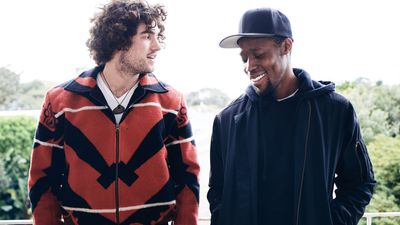In the Lab with Cape Town's Beat Sampras
In our new series, In the Lab, we get to know producers in their natural recording habitat. Here we get to know Cape Town duo Beat Sampras.
In our new series, In the Lab, we get to know producers and beatmakers in their natural habitat, the place where they record their music.
Kenyan-born David Migwalla is a self-taught beatmaker. Dressed top to toe in his habitual all black, the soukous-reared sports management graduate is a pillar of a man––sturdy, softspoken and focused. Head swaying, you can almost hear the cogs moving in his mind as he works. Each time he drops a beat, he lets out a light and satisfied chuckle as he loses himself in the next track.
On the couch beside him, London-born jazz student Dylan Fine is bright and burly. The wiry strings of his Fender Stratocaster twitch in the moving air.
It’s here in this room, on the top floor of Migwalla’s flat in leafy Rosebank, that the Cape Town-based duo made their first sounds in January of this year. Prior to that, Migwalla was making music as the producer and DJ known as Beat Sampras. The two have since coalesced into the well-matched and evenly tempered outfit that is Beat Sampras live. Their music is colourful, emotive and layered with soulful guitar licks. Their DJ sets are seasoned with witty throwbacks and reimagined samples.
I caught up with the two on a cloudy weekend in the Cape for the first instalment of In the Lab.
"We knew each other from playing soccer, something as un-music-related as that. And one day Dave said, 'Look, I make hip-hop beats. Do you wanna play with me at CTEMF?' after he heard me playing at a jazz jam around the corner. The cool thing is that hip-hop and jazz go together so effortlessly and I thought I’d really dig to collaborate with someone like him. So CTEMF happened… and I guess the rest is history." ––Dylan Fine
"The act has two elements: DJing and the live element, which are quite different. The priority right now is me and Dylan as the live act. You make what you listen to, and I learnt a lot of lessons from DJing which I apply to my live set. The live sets are designed to do something. Designed to make people respond in a certain way at certain times." ––David Migwalla
"I would like to get to a point where I can play some of the music we make in a DJ set, and [see] a remix culture in South Africa that is not just house music. That’s why I’ve been messing around with all these re-edits and remixes of tracks that I really dig." ––DM
"My guitar is a vintage Japanese Stratocaster. I wish I knew for sure how old it is. There was a golden period in the 80s when Japan was making the best ones. I bought it second-hand with the frets all worn like that. It has remarkable character which comes through in its sound and hence, our music." ––DF
"Either I’ll have a beat and Dylan will just listen and start to play over it, or Dylan will come over and say 'listen to this.' Then we’ll have to fight it out on the piano. It’s like we’re a company with different departments and we just allow each other to do what we know how to do and play to each others’ strengths." ––DM
"Dave comes from a strong Kenyan family. They’re all up in Pretoria and they’re really cool people. He’s got three sisters and one brother, and I got to meet them all when we went to visit. He grew up listening to a lot of Soukous as well so there’s a lot of that in him among other influences." ––DF
"I’ve been reconnecting with Africa musically and drawing inspiration from that, and that’s me expressing something of myself. I’ve been developing the skillset to express what I’ve been wanting to say and now I can apply it to creating a piece of art that is accessible to as many people as possible. Like, if you have a piece of music that sounds like it’s been made in Africa, African people are going to gravitate towards it; they feel at home in it. But if you put an 808 behind it and maybe some high hats, then people from somewhere else can recognise something in the same track, bringing the two worlds together. Imagine some soukous with some Timbaland behind it. I’ve grown up around golden era hip-hop as well and all of that is a part of me. I’ve never been one to look down on the new school either." ––DM
